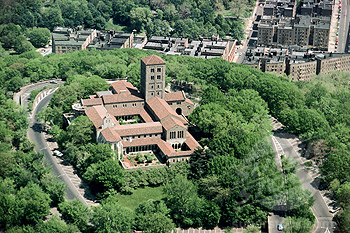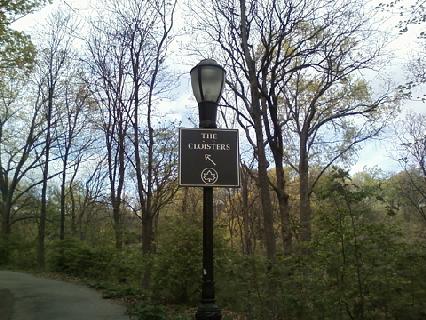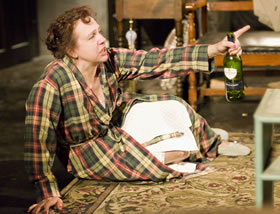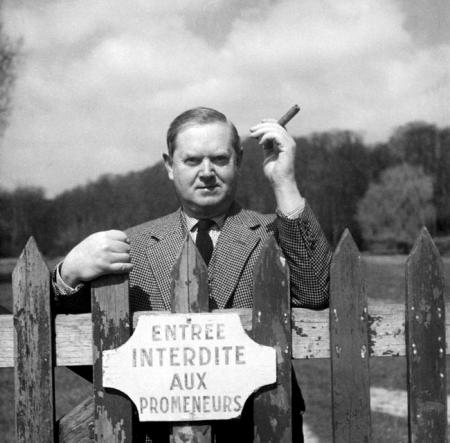 Spring came to New York on Sunday afternoon, so I celebrated its coming by doing something that I should have done long ago. I spent a couple of hours strolling through Fort Tryon Park, the sixty-seven-acre city park whose entrance is two blocks from my front door. Connoisseurs of medieval art know Fort Tryon Park as the site of the Cloisters, but if you live, as I do, in Hudson Heights, it does double duty as your backyard. Even though Mrs. T and I moved to Hudson Heights in the fall of 2010, I’d never taken the time to explore the park on foot, and when I admitted that shameful fact to an out-of-town friend who saw a show with me on Saturday night, she looked at me as though I’d just confessed to being an axe murderer. “And it’s right there?” she asked in a voice positioned midway between horror and disdain. It was clear that the time had come to change my ways, and the sun was shining so enticingly the next morning that I figured I had no choice but to get moving.
Spring came to New York on Sunday afternoon, so I celebrated its coming by doing something that I should have done long ago. I spent a couple of hours strolling through Fort Tryon Park, the sixty-seven-acre city park whose entrance is two blocks from my front door. Connoisseurs of medieval art know Fort Tryon Park as the site of the Cloisters, but if you live, as I do, in Hudson Heights, it does double duty as your backyard. Even though Mrs. T and I moved to Hudson Heights in the fall of 2010, I’d never taken the time to explore the park on foot, and when I admitted that shameful fact to an out-of-town friend who saw a show with me on Saturday night, she looked at me as though I’d just confessed to being an axe murderer. “And it’s right there?” she asked in a voice positioned midway between horror and disdain. It was clear that the time had come to change my ways, and the sun was shining so enticingly the next morning that I figured I had no choice but to get moving.
 Fort Tryon Park occupies a high hill on whose summit the Cloisters was built (or, rather, rebuilt, the museum having been moved brick by brick from France to New York between 1934 and 1938). It looks down on upper Manhattan and the Hudson River, and the views are stunning. You can reach the Cloisters by bus or take an elevator from the subway station to the top of the hill, but stalwart pedestrians prefer to walk up the winding trails that lead–eventually–from Broadway to the summit. That’s what I did: I walked from my apartment to the park, took the trail down to the street, then took a different trail back up the hill to the Cloisters.
Fort Tryon Park occupies a high hill on whose summit the Cloisters was built (or, rather, rebuilt, the museum having been moved brick by brick from France to New York between 1934 and 1938). It looks down on upper Manhattan and the Hudson River, and the views are stunning. You can reach the Cloisters by bus or take an elevator from the subway station to the top of the hill, but stalwart pedestrians prefer to walk up the winding trails that lead–eventually–from Broadway to the summit. That’s what I did: I walked from my apartment to the park, took the trail down to the street, then took a different trail back up the hill to the Cloisters.
That may sound simple enough in the telling, but I’m a middle-aged man who, if not altogether sedentary, is also not particularly athletic. I take a walk in the neighborhood most days, and when I do, I usually make a point of ascending the long staircase that leads from Washington Heights up to Hudson Heights. This, however, is not nearly so ambitious an undertaking as walking all the way down from the Cloisters to Broadway and back again, and I realized en route that it would have been a lot smarter for me to bite off a somewhat smaller piece.
 By the time I figured that out, though, it was too late for me to do anything about it, so I kept on walking, and I’m glad I did. I can’t say with absolute certainty that every nook and cranny of Fort Tryon Park is as beautiful as the parts that I saw on Sunday–it’s a big place–but I never saw anything that wasn’t beautiful, and by the time I made it to the top of the hill, I was asking myself why I’d waited so long to discover what is without doubt the best part of my neighborhood.
By the time I figured that out, though, it was too late for me to do anything about it, so I kept on walking, and I’m glad I did. I can’t say with absolute certainty that every nook and cranny of Fort Tryon Park is as beautiful as the parts that I saw on Sunday–it’s a big place–but I never saw anything that wasn’t beautiful, and by the time I made it to the top of the hill, I was asking myself why I’d waited so long to discover what is without doubt the best part of my neighborhood.
No sooner did I reach the trailhead than I was surrounded by stroller-pushing women. Hudson Heights is a child-friendly place, and on Sunday it looked like every mother who lives there had seized the opportunity to take her children for a walk. Their presence was a perfect metaphor for the season itself. It reminded me of one of the most beautiful verses from the Song of Solomon: For, lo! the winter is past, the rain is over and gone; the flowers appear on the earth; the time of the singing of birds is come, and the voice of the turtle is heard in our land.
As I listened to the birds singing and the children chattering, I felt the same surge of renewal in myself that I saw all around me on the street. I couldn’t help but think of the lucky streak that began when I cheated death and met Mrs. T six years ago, a few weeks before my fiftieth birthday. Ever since then, and especially in recent months, my life has been a near-unbroken string of happy surprises. In June I’ll be heading up to the MacDowell Colony in New Hampshire to spend five weeks working on Mood Indigo: A Life of Duke Ellington, after which I go directly to Massachusetts to rehearse my first play. Mere days ago I was inundated with still more good news.
No, I’m not as young as I used to be, but I very much doubt that I’ve ever felt much younger than I did on Sunday afternoon, trudging up a hill that should have been too high for me to climb and listening to the voice of the turtle in Fort Tryon Park.

 For those lucky enough to have seen Edie Falco and Frank Wood in “Side Man” 14 years ago, those will be fighting words, but Lee Miseska Gardner’s perormance as “Crazy Terry” Glimmer, who has been driven to drink by the bland, oblivious indifference of her husband Gene (Chris Mancusi), a jazzman who only comes to life on the bandstand, is snarlingly true to life. Mr. Mancusi is with her every step of the way….
For those lucky enough to have seen Edie Falco and Frank Wood in “Side Man” 14 years ago, those will be fighting words, but Lee Miseska Gardner’s perormance as “Crazy Terry” Glimmer, who has been driven to drink by the bland, oblivious indifference of her husband Gene (Chris Mancusi), a jazzman who only comes to life on the bandstand, is snarlingly true to life. Mr. Mancusi is with her every step of the way…. So it is–but as any critic can tell you, it’s also harder to praise than to pan. The reason for this is that the language of abuse is vastly more vivid than the language of praise. Evelyn Waugh, who in addition to being a great novelist was a superb book reviewer, neatly summed up this problem in a 1937 essay: “There are infinite gradations of blame, a thousand fresh and pungent metaphors for detraction, the epithets of dissatisfaction seem never to stale…but the moment one finds a work which genuinely impresses and delights, there seems no article of expression other than the clichés that grin at one from every publisher’s advertisement.”
So it is–but as any critic can tell you, it’s also harder to praise than to pan. The reason for this is that the language of abuse is vastly more vivid than the language of praise. Evelyn Waugh, who in addition to being a great novelist was a superb book reviewer, neatly summed up this problem in a 1937 essay: “There are infinite gradations of blame, a thousand fresh and pungent metaphors for detraction, the epithets of dissatisfaction seem never to stale…but the moment one finds a work which genuinely impresses and delights, there seems no article of expression other than the clichés that grin at one from every publisher’s advertisement.”